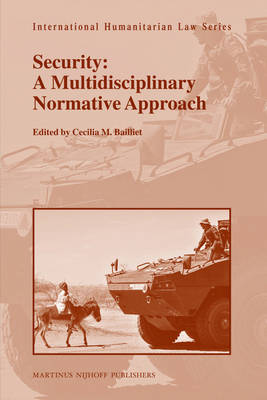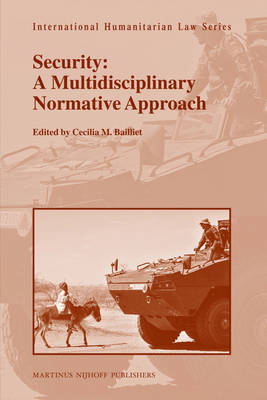
- Afhalen na 1 uur in een winkel met voorraad
- Gratis thuislevering in België vanaf € 30
- Ruim aanbod met 7 miljoen producten
- Afhalen na 1 uur in een winkel met voorraad
- Gratis thuislevering in België vanaf € 30
- Ruim aanbod met 7 miljoen producten
Security: A Multidisciplinary Normative Approach
€ 248,95
+ 497 punten
Omschrijving
Security is an all-encompassing term of art which is subject to diverse interpretations and understandings. It includes notions of protection against transnational threats, including terrorism, inter- and intra-state conflict, nuclear proliferation, forced migration, violation of women's rights, climate change, etc. The papers in this collection provide fresh voices in the security debate, uniting scholars from different fields of law and philosophy to address normative gaps in interpretation, evolution and application. Part I considers calls for an expanded mandate for the UN Security Council and regional international organisations. Part II reviews innovations within the arena of international humanitarian law, including whether it is possible to balance human rights and humanitarian law standards in peacekeeping operations, responses to "voluntary human shielding", and normative evolution in the removal of anti-personnel mines and the ban on cluster munitions. Part III embarks upon the realm of Ethics and Democracy: assessing the engagement of private soldiers and the legitimacy of targeted strikes pursuant to the "responsibility to prevent terrorism". It also considers internal conflicts within the notion of "democratic security", affirms the procedural guarantees of habeas corpus and non-refoulement as central elements of global justice, and calls for evaluation of gender equity as a measure of state fragility. Part IV confronts the global challenge of climate change as a security threat. Finally, Part V provides a practitioner's perspective which discusses possible grounds for a gap between academics and security practitioners.
Specificaties
Betrokkenen
- Uitgeverij:
Inhoud
- Aantal bladzijden:
- 400
- Taal:
- Engels
- Reeks:
- Reeksnummer:
- nr. 26
Eigenschappen
- Productcode (EAN):
- 9789004172968
- Verschijningsdatum:
- 28/08/2009
- Uitvoering:
- Paperback
- Formaat:
- Trade paperback (VS)
- Afmetingen:
- 165 mm x 246 mm
- Gewicht:
- 771 g

Alleen bij Standaard Boekhandel
+ 497 punten op je klantenkaart van Standaard Boekhandel
Beoordelingen
We publiceren alleen reviews die voldoen aan de voorwaarden voor reviews. Bekijk onze voorwaarden voor reviews.









